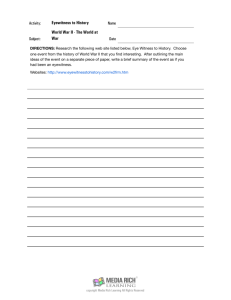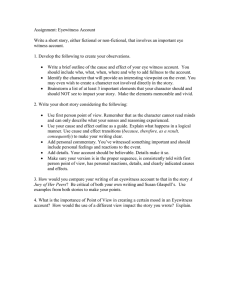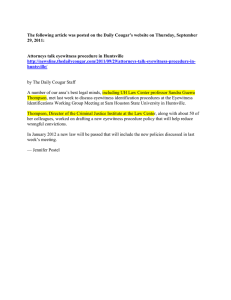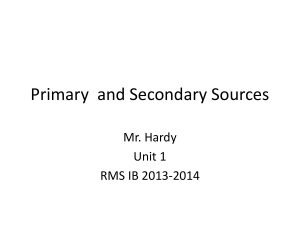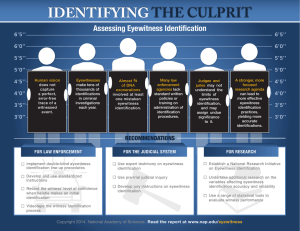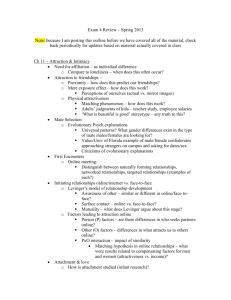Document 17911376
advertisement
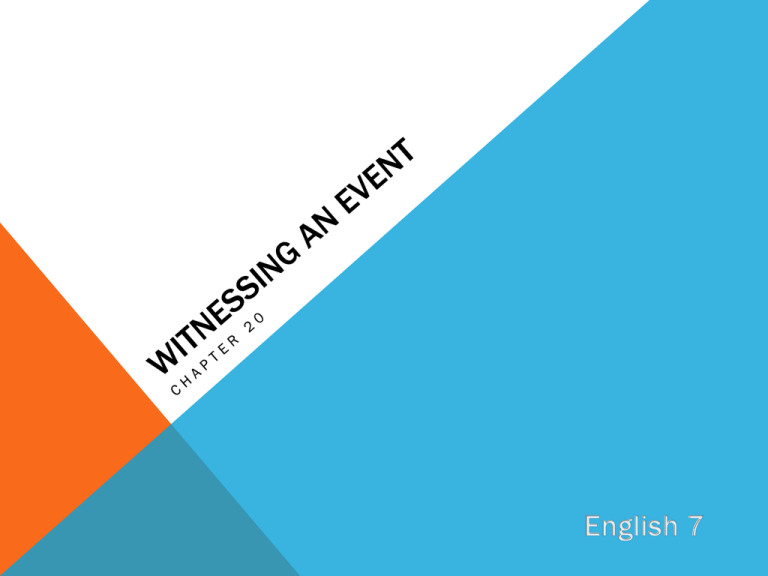
September 25, 2013 LG: I will be able to read and interpret an eyewitness account. Eyewitness Account (p.503) YOUR TURN 1: Discovering An Eyewitness Account Think of an exciting or unusual event you have seen lately. Answer these questions in your English notebook. Write in complete sentences. • What was the event? • Why does this event stand out in your mind? • What details of the event can you recall most easily? Why do you think you can recall these details? READING QUESTION 1 1. What do you think this story will be about? September 25, 2013 LG: I will be able to read and interpret an eyewitness account. Eyewitness Account (p.503) Sentences about event should be written here. “Hopi Snake Ceremonies” Reading Questions 1. This story will be about… READING QUESTION 2 2. How does this author help you see the dancers? September 25, 2013 LG: I will be able to read and interpret an eyewitness account. Eyewitness Account (p.503) Sentences about event should be written here. “Hopi Snake Ceremonies” Reading Questions 1. This story will be about… 2. The author… READING QUESTION 3 3. Why do you think the author includes the detail about the snake biting the dancer? September 25, 2013 LG: I will be able to read and interpret an eyewitness account. Eyewitness Account(p.503) Sentences about event should be written here. “Hopi Snake Ceremonies” Reading Questions 1. This story will be about… 2. The author… 3. The author… READING QUESTION 4 4. Why do you think the author chose to write an account about this particular event? September 25, 2013 LG: I will be able to read and interpret an eyewitness account. Eyewitness Account (p.503) Sentences about event should be written here. “Hopi Snake Ceremonies” Reading Questions 1. This story will be about… 2. The author… 3. The author… 4. The author… Eyewitness Account (p.503) Your Turn 1 Sentences about event should be written here. “Hopi Snake Ceremonies” Reading Questions 1. This story will be about… 2. The author… 3. The author… 4. The author… September 26, 2012 LG: I will be able to identify descriptive language and the implied main idea in a piece of literature Finding Descriptive Language (p.508) Your Turn 2 (Copy format below.) Sensory language 1. Figures of speech 1. Precise words 1. 2. 2. 2. YOUR TURN 2: Finding Descriptive Language • Re-read “Hopi Snake Ceremonies” on pages 505-506. • Find at least two examples each of sensory language, figures of speech, and precise words. Write the examples in your English notebook. • In a small group, tell what examples of descriptive language you found and discuss how they helped you picture the events clearly. Turn to page 505 in your textbook to re-read “Hopi Snake Ceremonies” and complete Your Turn 2 by Jennifer Owings Dewey. YOUR TURN 3: Mapping the Implied Main Idea With your assigned group, find the implied main idea of “Hopi Snake Ceremonies” by completing the following steps. Create a main idea map. • Each group member is assigned parts of the selection. Some paragraphs in the reading have main ideas, and some do not. Each group member should use the steps in Mapping It Out on page 509 to come up with a main idea statement for his or her section. • As a group, look at all of your main idea statements. What do they say about the “Hopi snake ceremony? Sum up these main ideas into one overall statement that tells the main idea of the whole reading. This is the reading’s implied main idea. • Confirm the overall main idea your group has identified by checking it against details from the reading. September 26, 2012 LG: I will be able to identify descriptive language and the implied main idea in a piece of literature Finding Descriptive Language (p.508) Your Turn 2 (Copy format below.) Sensory language 1. Figures of speech 1. Precise words 1. 2. 2. 2. September 30, 2012 LG: I will be able to identify descriptive language and the implied main idea in a piece of literature Mapping the Implied Main Idea (p.510) Your Turn 3 (Complete Your Turn 3 in the packet.) PAGE 511 PAGE 511 CONTEXT CLUES PRACTICE In your journal, complete the context clues practice activity (page 511). Write the part of speech and your definition of the word. Context Clues (p.511) 1. rituals: 2. coachwhips: 3. stocky: 4. obscured: 5. cajole: CONTEXT CLUES PRACTICE Rituals: (noun) an established procedure Coachwhips: (noun, pl) a long, slender snake Stocky: (adjective) thick and strong Obscured: (adjective) hard to see Cajoled: (verb) persuade WRITING AN EYEWITNESS ACCOUNT In your English notebook, silently write about an eyewitness account. Write continuously. Use the prompts below if necessary. Refer to packet if needed. Describe a party or picnic you attended. Tell about meeting or seeing a famous person. Describe an exciting play in a game you saw. Give an account of a recent visit to a museum. Describe the sounds, sights, and smells of a typical Saturday in your neighborhood. DON’T STOP WRITING UNTIL I TELL YOU TIME IS UP. Complete YOUR TURN 4: Choosing An Experience in packet. Complete YOUR TURN 5: Identifying Your Audience in packet. Complete YOUR TURN 6: Gathering and Organizing Ideas in packet. Complete Mini-lesson: Showing Instead of Telling in packet. Complete YOUR TURN 7 : Writing Your Eyewitness Account in packet or Partyfold Graphic Organizer. Writer's Model • How will you grab your reader’s attention? • How will you state what the event is? • Remember: You are not writing your topic sentence. You are implying the main idea. ATTENTION GRABBING TECHNIQUES Current Event Incident Startling Fact Startling Statement Unusual Opinion Historical Event Series of Analogies Division of Topic Strong Opinion Anecdote Quotation Description of Something Familiar Example Describe a Compelling Scene Contradiction Promise of Benefit Brief Narrative Memorable Sensory Detail ATTENTION GRABBING TECHNIQUES Unusual Opinion: School should be in session twelve months a year. Quotation: “To be great is to be misunderstood” (Ralph Waldo Emerson). Description of Something Familiar: It is Saturday morning, and you have slept well past your early, school-day alarm. A friend calls and suggests meeting at the batting cages in North Park. On the way there, you stop at Tomato Pie for a late breakfast. Describe a Compelling Scene: As muddy flood water raged and swelled, desperate people could be seen perched on roof tops desperately yelling and signaling for help. Rain pelted them; wind whipped at their soaked clothing. Contradiction: Parents and other caregivers are not the most important role models in their children’s lives. Memorable Sensory Detail: The stringent sting of smoke sliced into the once untainted air of my living room. Rhetorical Question: What is ethical behavior? Who gets to decide what is right and what is wrong? TRANSITIONS Transitional words or phrases are used throughout paragraphs to connect ideas and tell how they are related. On your draft… Add at least four transition words. • • • • What feelings or questions do you have about what you observed? What is the importance of the event? What was the point or purpose of you sharing your story? Remember: This is your last chance to make an impact on the reader. Assignment: Complete a draft of your eyewitness account on a loose piece of composition paper. WRITE ON YOUR PAPER: Joseph Smith September 30, 2011 English / Period 2 Eyewitness Account – Draft Use your graphic organizer, notes on Writing an Eyewitness Account, and textbook pages 503-512 as resources. Skip lines (double space) for your entire draft and make sure your name is on every page. X Your draft should be five paragraphs long, including an introduction, three body paragraphs, and a conclusion. X Due date: X X X X X X X X X X (Begin introduction here ………) Complete Your Turn 8: Revising: Eyewitness Account in packet. REVISING FOR STYLE Precise nouns illustrate particular persons, places, or things. A noise can become a clank, squeak, clatter, shriek, or rattle. Precise adjectives describe nouns specifically. A fun amusement park ride can be transformed into a thrilling, exhilarating, pulse-pounding-ride. On your draft… Add at least one precise noun in each paragraph. Add at least one precise adjective in each paragraph. REVISING FOR STYLE A simile makes a comparison between two unlike things using the words like or as. “Only today I wish I didn’t have only eleven years ratting inside me like pennies in a tin Band-Aid box.” A metaphor makes a direct comparison between two unlike things. “The road was a ribbon of moonlight over the purple moor.” On your draft… Add at least one simile. Add at least one metaphor. Complete Mini-lesson: Focus on Word Choice in packet. PARTNER EVALUATION Find your partner and choose a spot where you can work together comfortably and quietly. Use the ‘First Draft Checklist’ to make sure your partner has fulfilled all of the requirements of the eyewitness account thus far. Make any additional comments or notes on your partner’s draft. Your comments should be constructive! DO NOT correct spelling, grammar, or punctuation! Complete Your Turn 8 (part 2): Revising: Evaluating Eyewitness Accounts in packet. Complete Your Turn 9: Guidelines for Proofreading in packet. Complete Final Draft
